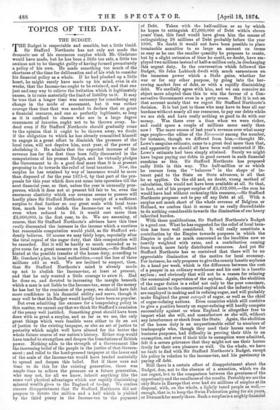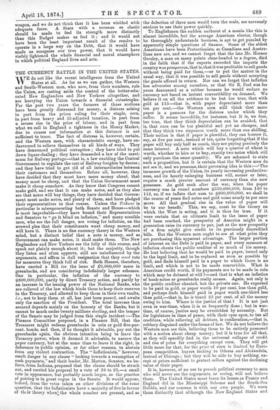TOPICS OF THE DAY.
THE BUDGET.
THE Budget is respectable and sensible, but a little timid. Sir Stafford Northcote has not only not made the dramatic use of his enormous surplus which Mr. Gladstone would have made, but he has been a little too safe, a little too anxious not to be thought guilty of having formed prematurely a policy of his own. He made something too much of the shortness of the time for deliberation and of his wish to consider his financial policy as a whole. If he had plucked up a little heart, he might surely have made up his mind, even in six weeks, that the Income-tax ought to be retained, and that one just and easy way to relieve the irritation which it legitimately causes, is to raise materially the limit of liability to it. It may be true that a longer time was necessary for considering any change in the mode of assessment, but it was rather courage than time that was needed to declare that so great a financial resource, and one so perfectly legitimate, so long as it is confined to classes who are in a large degree consumers of luxuries, ought not to be thrown away. In- deed even if Sir Stafford Northcote should gradually come to the opinion that it ought to be thrown away, we doubt if the obligation to which he has already committed himself to engage in a great effort to diminish the pressure of the local rates, will not deprive him, next year, of the power of abolishing it. He admits that the expected increase of the revenue has for the first time been fully discounted in the computations of his present Budget, and he virtually pledges the Government to do a good deal more than it is at present proposing to do towards the relief of local taxation. Now, the surplus he has retained by way of insurance would be more than disposed of for the year 1875-6, by that part of the pro- posals for this year which does not come into operation till the next financial year, so that, unless the year is unusually pros- perous, which it does not at present bid fair to be, even the enormous elasticity which our revenue seems to possess will hardly place Sir Stafford Northcote in receipt of a sufficient surplus to deal further on any great scale with local taxa- tion, much less to abolish the Income-tax as well, which even when reduced to 2d. it would cost more than £3,000,000, in the first year, to do. We are assuming, of course, that Sir Stafford Northcote's advisers have this time really discounted the increase in the income which a cautious but reasonable computation would yield, as Sir Stafford evi- dently believes. Of course we may fairly hope, especially after the total repeal of the sugar duty, that this computation will be exceeded. But it will be hardly so much exceeded as to give room for a great measure on local taxation,—Sir Stafford hinted at the possible transfer of the house duty, according to Mr. Goschen's plan, to local authorities,—and the loss of three millions odd as well. We are inclined to suspect, then, that Sir Stafford Northcote's mind is already made up not to abolish the Income-tax, at least at present, and that he only wanted a little courage to avow it. Had he done so, and devoted to increasing the margin beneath which a man is not liable to the Income-tax, some of the money he has lost by the remission of the penny, we should have felt more confidence in his financial ability and nerve, though it may well be that his Budget would hardly have been so popular.
But even admitting the excuses for a temporising policy in this matter, we cannot say that we think Sir Stafford's remission of the penny well justified. Something great should have been done with so great a surplus, and as far as we see, the only great things which were feasible were either to do an act of justice to the existing taxpayer, or else an act of justice to posterity which might well have altered for the better the whole future course of our nation's history. Either step would have tended to strengthen and deepen the foundations of British power. Nothing adds to the strength of a Government like the increasing belief of the people in the justice of that Govern- meat; and relief to the bard-pressed taxpayer at the lower end of the scale of the Income-tax would have tended materially to spread and deepen this belief. But if there were not time to do this for the existing generation, there was ample time to relieve the pressure on a future generation, who may not, for all we know, inherit anything like the same vast physical advantages which our rapidly diminishing mineral wealth gives to the England of to-day. We confess sincere disappointment that Sir Stafford Northcote did not propose to devote the million and a half which is yielded by the third penny in the Income-tax to the payment
of Debt. Taken with the half-million or so by which he hopes to extinguish £7,000,000 of Debt within eleven years' time, this fund would have given him the means of extinguishing 28 millions of Debt probably before the year 1890. No doubt it would not have been possible to place
terminable annuities to so large an amount on terms as easy as he can the smaller quantity he proposes to create,
but by a slight extension of time he could, no doubt, have em- ployed two millions instead of half-a-million only, in discharging this urgent duty. In the conversation which followed the Sir John Lubbock dwelt with much earnestness on the immense power which a Stale gains, whether for
war or for any other purpose, by going into the bor- rowing market free of debt, or with a rapidly diminishing debt. We cordially agree with him, and we can conceive no object more adapted than this to win the favour of a Con- servative Government even in a party sense. But it is not on that account mainly that we regret Sir Stafford Northcote's decision. It is but just to those who may have to bear all our burdens without nearly all our resources, to pay our debts while we are rich and have really nothing so good to do with our money. Was there ever a time when we were richer, and could spare a couple of millions more easily than now ? The mere excess of last year's revenue over what many sage people—the editor of the Economist among the number, for instance, though we differed from him,—thought Mr. Lowe's sanguine estimate, came to a great deal more than that, and apparently we should all have been well contented if Mr. Lowe's estimate had been simply attained. Surely we might have begun paying our debts in good earnest in such financial sunshine as this. Sir Stafford Northcote has proposed sadly little in this way. The half-million or so which he rescues from the "balances " in the shape of in- terest paid to the State on State advances, is all that he so applies. On the old and, no doubt, wrong method of calculation, this would not have been available at all. So that, in fact, out of his proper surplus of £5,492,000,—the sum her would have had without reckoning this resource,—Sir Stafford Northcote proposes not to pay off any Debt at all. With a. surplus not much short of the whole revenue of Belgium or Holland, we confess that it seems to us really discreditable to do nothing considerable towards the diminution of our heavy- inherited burden.
With these qualifications, Sir Stafford Northcote's Budget is a good one. What he has suggested for the relief of local taxa- tion has been well considered. It will really constitute a contribution by the Empire towards purposes in which the Empire is quite as much concerned as the localities now so- heavily weighted with rates, and a contribution coming from much more fairly distributed resources. And yet Sir Stafford Northcote has so contrived that there will be no- appreciable diminution of the motive for local economy. For instance, he only proposes to give the county lunatic asylums 4s. a head per week, which is the difference between the cost of a pauper in an ordinary workhouse and his cost in a lunatic asylum ; and obviously that will not be a reason for relaxing the economical supervision of the asylum. Again, the abolition of the sugar duties is a relief not only to the poor consumer, but still more to the commercial capital and the industry whicb. are employed in making and in refining sugar, and will probably make England the great entrepot of sugar, as well as the chief of sugar-refining nations. Even countries which still contrive to give a positive bounty on sugar-refining will hardly compete successfully against us when England is altogether free to import what she will, and manufacture as she will, without any interference or check from the State. Again, the abolition of the horse duty is an unquestionable relief to numbers of tradespeople who, though they used their horses much for business purposes, had difficulty in proving their title to an exemption, and even if their title to exemption were admitted, felt it a severe grievance that they might not use their horses freely for their own pleasure as well. On the whole, we have no fault to find with Sir Stafford Northcote's Budget, except his policy in relation to the income-tax, and his parsimony in paying off debt.
Still there is a certain effect of disappointment about the Budget, due, not to the absence of a sensation, which we do not regret, hilt to the comparison between the greatness of the opportunity and the smallness of the results. Probably we are the only State in Europe that ever had six millions of surplus at its disposal, with, on the whole, a lightly taxed people as well,— enough, that is, to keep the Swiss Federation going for six years, or Denmarkfor nearly three. Such a surplus is a mighty financial weapon, and we do not think that it has been wielded with adequate force. A State with a revenue so elastic should be made to feel its strength more distinctly than this Budget makes us feel it ; and it would not have been the least important result of the resolve to operate in a large way on the Debt, that it would have made us recognise our true power, that it would have visibly lightened the whole financial and moral atmosphere in which political England lives and acts.



































 Previous page
Previous page